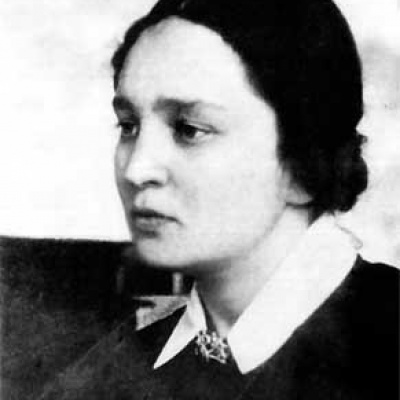
Maria Yudina
Maria (Mariya) Veniaminovna Yudina (Russian: Мари́я Вениами́новна Ю́дина, Mariya Veniaminovna Yudina; September 9 [O.S. August 28], 1899 – November 19, 1970) was an influential Soviet pianist. Yudina was born to a Jewish family in Nevel, Vitebsk Governorate, Russian Empire. She studied at the Petrograd Conservatory under Anna Yesipova and Leonid Vladimirovich Nikolayev. She also briefly studied privately with Felix Blumenfeld. Her classmates included Dmitri Shostakovich and Vladimir Sofronitsky. Though primarily known for her interpretations of Bach and Beethoven, she was a keen champion of contemporary composers including works of her good friend Shostakovich. Yudina was also a highly regarded champion of J. S. Bach's music. Some have claimed that Yudina's way of playing Bach foreshadows the style of Glenn Gould. Yudina was one of the few Soviet artists who openly opposed the Communist regime, resulting in her being banned from teaching or performing on stage on several occasions. She can also be considered one of the great Christian thinkers of Russia in the twentieth century (among her friends was the philosopher Pavel Florensky). After her graduation from the Petrograd Conservatory, Yudina was invited to teach there, which she did until 1930, when she was thrown out of the institution because of her religious convictions and vocal criticism of the Soviet leadership. After being unemployed and homeless for a couple of years, Yudina was invited to teach the graduate piano course at the Tbilisi State Conservatory (1932–1933). In 1936, upon Heinrich Neuhaus's suggestion, Maria Yudina joined the piano faculty of the Moscow Conservatory, where she taught until 1951. In 1944-1960, Yudina taught chamber ensemble and vocal class at the Gnessin Institute (now Gnessin Russian Academy of Music). In 1960, Maria Yudina was thrown out of the Gnessin Institute because of her religious attitudes and her advocation of modern Western music. She continued to perform in public, but her recitals were forbidden to be recorded. After an incident during one of her recitals in Leningrad, when she read Boris Pasternak's poetry from the stage as encore, Yudina was banned from performing for five years. In 1966, when the ban was lifted, Maria Yudina gave a cycle of lectures on Romanticism at the Moscow Conservatory. Yudina has the distinction of being Joseph Stalin's favorite pianist. One night, Stalin heard a performance of Mozart's Piano Concerto No. 23 on the radio performed by Yudina and asked for a copy. It was a live broadcast so officials woke up Yudina, drove her to a recording studio where a small orchestra had quickly been assembled, and made her record the concerto in the middle of the night, a single copy was pressed from the matrix and then presented to Stalin (the matrix has survived and the recording has been available on CD). It is said that he broke out in tears after hearing only the first notes of Yudina's playing. Despite the recognition from Stalin the pianist remained an uncompromising critic of the Stalinist regime with unprecedented impunity. She was awarded the Stalin Prize and donated its monetary portion to the Orthodox Church for "perpetual prayers for Stalin's sins". She died in Moscow in 1970. Yudina's playing was marked by great virtuosity, spirituality, strength and intellectual rigor. However, her playing was also very individual in style and tone. Sviatoslav Richter said of her playing: "She was immensely talented and a keen advocate of the music of her own time: she played Stravinsky, whom she adored, Hindemith, Krenek and Bartók at a time when these composers were not only unknown in the Soviet Union but effectively banned. And when she played Romantic music, it was impressive – except that she didn't play what was written. Liszt's Weinen und Klagen was phenomenal, but Schubert's B flat major Sonata, while arresting as an interpretation, was the exact opposite of what it should have been, and I remember a performance of the Second Chopin Nocturne that was so heroic that it no longer sounded like a piano but a trumpet. It was no longer Schubert or Chopin, but Yudina." The art of Yudina represents a whole epoch in the Russian cultural history. Unlike other fellow musicians, Yudina always tried to go beyond her personal comfort zone, making friends and collaborating with famous writers, artists and architects. Among her friends were Boris Pasternak (who did the first reading of his novel Doctor Zhivago at Yudina's apartment as early as February 1947), Osip Mandelstam, Mikhail Bakhtin, Pierre Suvchinsky, Dmitri Shostakovich, Pierre Boulez, Karlheinz Stockhausen and many others. Thanks to efforts of Yudina's friends in Russia, particularly Anatoly Kuznetsov, Yudina's letters and writings were published in the late 90s-early 00s. There were several attempts to complete the set of Yudina's recordings. Most of her recordings released on LPs in Russia are hard to obtain. In literature Yudina was portrayed by Alexei Losev as a character in his novel Woman as Thinker. The flawed heroine Losev created was a woman musician who spouted philosophy but held herself to lower standards. The novel has been criticized as an outlet for Losev's difficult relationship with Yudina, and as a poor example of his capabilities as a writer. The novella caused the cessation of their friendship in 1934.
